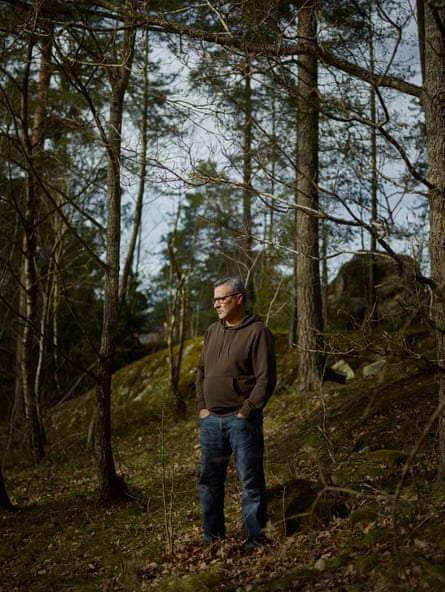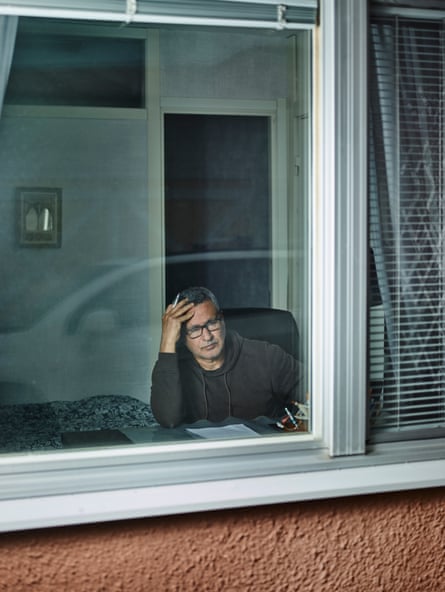
The first trial to contend with the post-9/11 abuse of detainees in US custody begins on Monday, in a case brought by three men who were held in the US-run Abu Ghraib prison in Iraq.
The jury trial, in a federal court in Virginia, comes nearly 20 years to the day that the photographs depicting torture and abuse in the prison were first revealed to the public, prompting an international scandal that came to symbolize the treatment of detainees in the US “war on terror”.
The long-delayed case was brought by Suhail Najim Abdullah Al Shimari, Salah Al-Ejaili and As’ad Al-Zuba’e, three Iraqi civilians who were detained at Abu Ghraib, before being released without charge in 2004. (A fourth man, Taha Yaseen Arraq Rashid, was dismissed from the case in 2019.) The men are suing CACI Premier Technology, a private company that was contracted by the US government to provide interrogators at the prison. The company has fought for 16 years to get the case thrown out, ultimately losing its last appeal in November.
“This is a historic trial that we hope will deliver some measure of justice and healing for what President Bush rightly deemed disgraceful conduct that dishonored the United States and its values,” said Katherine Gallagher, a senior attorney at the Center for Constitutional Rights, or CCR, which brought the case on behalf of the former detainees.
The suit was filed under the Alien Tort Statute, which allows foreign nationals to file cases in US courts for violations of international law; the plaintiffs are seeking damages. Al-Ejaili, who now lives in Sweden, will be the first torture survivor to testify about his treatment while in US custody from inside a US federal court. The other two men will testify remotely from Iraq as they were not granted visas to travel.
‘Sadistic, blatant and wanton abuses’
In November 2003, Al-Ejaili was working as a journalist for Al Jazeera and covering an explosion in Diyala district, north of Baghdad, when he was arrested by US forces and moved to military stations in different districts, before eventually being taken to Abu Ghraib.




At the prison, he was forced to strip naked and left without clothes for hours on end. Over the nearly two months he spent there, guards beat him, placed a black hood over his head and left him for hours with his hands tied, keeping him in conditions of sensory deprivation and threatening him with dogs during frequent interrogations. His captors were aware Al-Ejaili was a journalist: he had media accreditation from US forces, and guards at Abu Ghraib taunted him by calling him “Al Jazeera”. He was never given a reason for his arrest.
“I transformed, in a second, from a journalist on the ground who has a social status and people look at me in a certain way” Al-Ejaili told Democracy Now! on the 10th anniversary of the Abu Ghraib scandal, “to a humiliated person, stripped down forcefully, very naked, helpless.”
Like most detainees there, Al-Ejaili was never charged with a crime. When he was finally taken to court, a judge ordered his immediate release. His co-plaintiffs also endured similar abuses: guards subjected Zuba’e to extremely hot and cold water, beat his genitals with a stick and kept him in a solitary cell for nearly a year. Al Shimari, who was detained for five years, including two months at Abu Ghraib, was tortured with electric shocks, deprived of food, threatened by dogs and kept naked while forced to engage in physical activities to the point of exhaustion, according to the lawsuit.
After his release, Al-Ejaili spoke out about the psychological and physical torture he was subjected to, but found that few believed his account – until the photos emerged. “Everybody knows that people were tortured at Abu Ghraib; this is a fact that cannot be covered up or hidden,” he says now. “But there are a lot of people who got away with it.”




The widespread abuse at Abu Ghraib came to mainstream public attention on 28 April 2004, a year into the US invasion of Iraq, when CBS News first broadcast photos of US soldiers abusing detainees in their custody. The images depicted a hooded man standing on a box and hooked to electrical wires, and naked detainees piled on top of each other, dragged from a leash or forced to simulate sexual acts – while smiling soldiers posed in front of them with their thumbs up.
Detailed reports of the torture soon followed, and in 2004, an official investigation by US army Maj Gen Antonio Taguba concluded that “sadistic, blatant and wanton criminal abuses” had been inflicted upon detainees.
Despite the global scandal caused by the photographs and subsequent media reports, accountability has been elusive, even as Abu Ghraib has come to epitomize the horrors of the US war on terror.
Only a handful of lower-rank soldiers faced military trials; no military or political leaders, or private contractors, were held legally accountable for what happened at Abu Ghraib or at any other facility where US detainees were tortured. Notably, the conduct at Abu Ghraib was condemned by the highest levels of the Bush administration, including the president and military leadership.
It has been an uphill battle to bring the case against CACI to trial. Since the lawsuit was filed in 2008, the company has tried to dismiss it more than 20 times, citing an array of technical arguments and primarily maintaining that because its employees were working for the US military, immunity and legal protections they argue should be afforded to the government should also apply to them. The company’s late former CEO, Jack London, went as far as writing an 800-page book – Our Good Name – in an effort to defend CACI’s reputation.




CACI and the Department of Defense did not respond to requests for comment.
The case is the last of three suits CCR brought against CACI and other contractors in connection to widespread abuse at Abu Ghraib. A federal appeals court in 2009 dismissed a suit on behalf of 250 Iraqi civilians who had been subjected to torture, on the basis of a new legal doctrine known as “battlefield preemption” that has been used to dismiss similar suits against contractors used in war. CCR also settled another case it brought against L-3 Services, which provided translation services at the prison, on behalf of 72 men who were tortured there.
Other efforts to secure public accountability for other instances of US torture – including at the Guantanamo Bay detention camp and CIA “black sites” around the world – have also faltered. The closest that victims of US torture came to a day in court was through a lawsuit against James Elmer Mitchell and John “Bruce” Jessen, two psychologists who were paid $80m by the CIA to design and implement the agency’s interrogation program. That case settled in 2017, shortly before going to trial.
A growing industry
As governments’ reliance on private actors in conflict zones and crisis situations has grown exponentially since the war in Iraq, the case is also a test of the courts’ ability to hold those contractors responsible for human rights abuses.
The wars in Iraq and Afghanistan – the “most contracted-out wars in US history,” said Gallagher of CCR – earned private companies trillions in defense and other government contracts. To this day, CACI continues to make millions in US government contracts, including with the departments of defense and homeland security.
“Over the course of this litigation, CACI has ballooned as a private government contractor,” Gallagher said. “In many ways, this case may be seen as setting a precedent for holding contractors accountable for human rights violations should they happen in other contexts, too.”
It was a later incident, the 2007 massacre of 17 civilians at Nisour Square in Baghdad by employees of the private military company Blackwater, that put a spotlight on the crimes committed by private contractors in Iraq.
Since then, the international community has sought to set standards for private military companies and the governments that hire them, and several private companies have signed onto an international code of conduct. But legal consequences for contractors have been rare.
“There has been a huge accountability void,” said Sorcha MacLeod, a member of a UN working group seeking to establish legally binding parameters for the use of private military and security companies.
But she stressed that responsibility ultimately lies with the states that hire them. “States outsource, and then they try and accept no responsibility,” she said. “But states are the primary actors when it comes to human rights protection: they have a fundamental obligation to protect human rights and they cannot outsource that.”




Twenty years after he was tortured at Abu Ghraib, and as he prepares to once again describe it all in court, Al-Ejaili still finds it difficult to speak about the experience. After he left Abu Ghraib, he said, he spent years fearing for himself and his family, even as he departed Iraq for Jordan, then Qatar, where he continued to report for Al Jazeera. He eventually reached Sweden, where he received asylum and now works as an independent producer.
He has only returned to Iraq once. “I began to feel that anything could happen to me at any point without any reason,” he said.
Despite the years, Al-Ejaili has remained confident that the same government that had been behind the abuse could also eventually deliver justice.
“It has taken a very long time to get here, but we got here,” he said.
“One of the reasons we pursued this case is so the American people learn about what happened with the companies contracted by their government,” he added. “This is the history of their country. Perhaps if the court rules in our favor it will correct, slightly, this black mark in US history.”
This post was originally published on this site be sure to check out more of their content.








